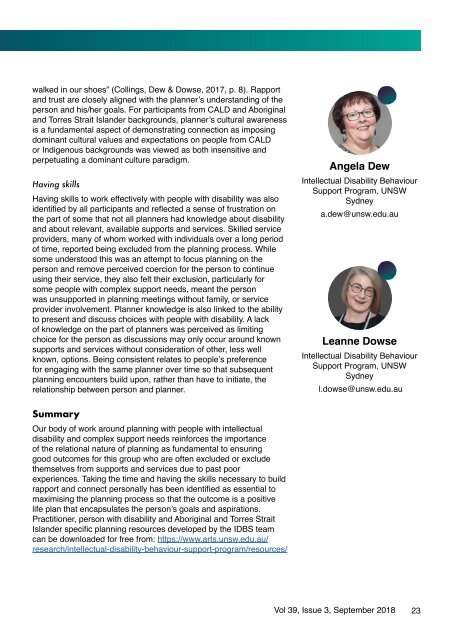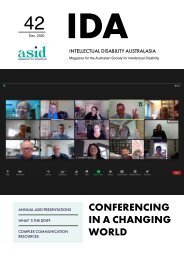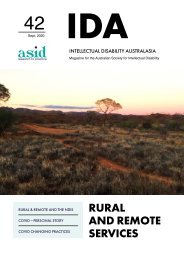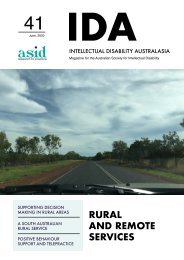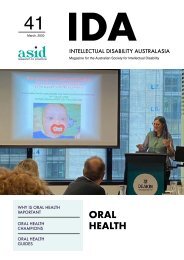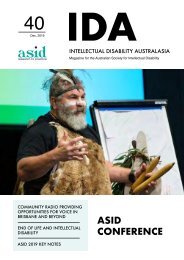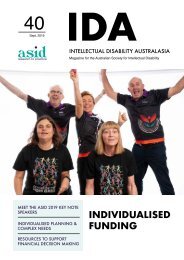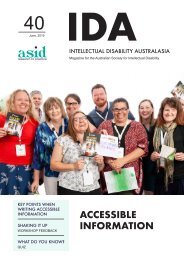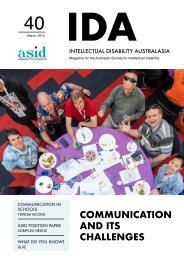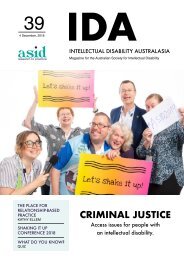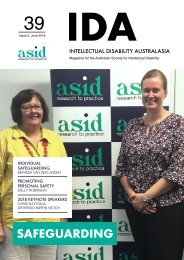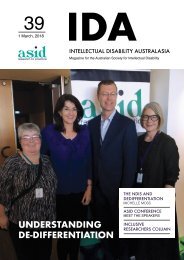IDA Magazine Vol 39 Iss 3 (Sept 2018)
Create successful ePaper yourself
Turn your PDF publications into a flip-book with our unique Google optimized e-Paper software.
walked in our shoes” (Collings, Dew & Dowse, 2017, p. 8). Rapport<br />
and trust are closely aligned with the planner’s understanding of the<br />
person and his/her goals. For participants from CALD and Aboriginal<br />
and Torres Strait Islander backgrounds, planner’s cultural awareness<br />
is a fundamental aspect of demonstrating connection as imposing<br />
dominant cultural values and expectations on people from CALD<br />
or Indigenous backgrounds was viewed as both insensitive and<br />
perpetuating a dominant culture paradigm.<br />
Having skills<br />
Having skills to work effectively with people with disability was also<br />
identified by all participants and reflected a sense of frustration on<br />
the part of some that not all planners had knowledge about disability<br />
and about relevant, available supports and services. Skilled service<br />
providers, many of whom worked with individuals over a long period<br />
of time, reported being excluded from the planning process. While<br />
some understood this was an attempt to focus planning on the<br />
person and remove perceived coercion for the person to continue<br />
using their service, they also felt their exclusion, particularly for<br />
some people with complex support needs, meant the person<br />
was unsupported in planning meetings without family, or service<br />
provider involvement. Planner knowledge is also linked to the ability<br />
to present and discuss choices with people with disability. A lack<br />
of knowledge on the part of planners was perceived as limiting<br />
choice for the person as discussions may only occur around known<br />
supports and services without consideration of other, less well<br />
known, options. Being consistent relates to people’s preference<br />
for engaging with the same planner over time so that subsequent<br />
planning encounters build upon, rather than have to initiate, the<br />
relationship between person and planner.<br />
Angela Dew<br />
Intellectual Disability Behaviour<br />
Support Program, UNSW<br />
Sydney<br />
a.dew@unsw.edu.au<br />
Leanne Dowse<br />
Intellectual Disability Behaviour<br />
Support Program, UNSW<br />
Sydney<br />
l.dowse@unsw.edu.au<br />
Summary<br />
Our body of work around planning with people with intellectual<br />
disability and complex support needs reinforces the importance<br />
of the relational nature of planning as fundamental to ensuring<br />
good outcomes for this group who are often excluded or exclude<br />
themselves from supports and services due to past poor<br />
experiences. Taking the time and having the skills necessary to build<br />
rapport and connect personally has been identified as essential to<br />
maximising the planning process so that the outcome is a positive<br />
life plan that encapsulates the person’s goals and aspirations.<br />
Practitioner, person with disability and Aboriginal and Torres Strait<br />
Islander specific planning resources developed by the IDBS team<br />
can be downloaded for free from: https://www.arts.unsw.edu.au/<br />
research/intellectual-disability-behaviour-support-program/resources/<br />
<strong>Vol</strong> <strong>39</strong>, <strong>Iss</strong>ue 3, <strong>Sept</strong>ember <strong>2018</strong><br />
23


